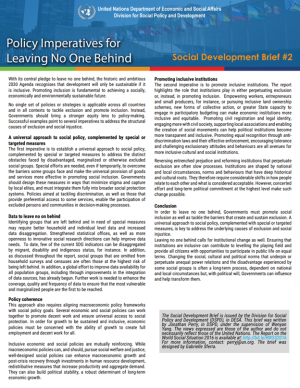With its central pledge to leave no one behind, the historic and ambitious 2030 Agenda recognizes that development will only be sustainable if it is inclusive. Promoting inclusion is fundamental to achieving a socially, economically and environmentally sustainable future.
No single set of policies or strategies is applicable across all countries and in all contexts to tackle exclusion and promote inclusion. Instead, Governments should bring a stronger equity lens to policy-making. Successful examples point to several imperatives to address the structural causes of exclusion and social injustice.
A universal approach to social policy, complemented by special or targeted measures The first imperative is to establish a universal approach to social policy, complemented by special or targeted measures to address the distinct obstacles faced by disadvantaged, marginalized or otherwise excluded social groups.
Special efforts are needed, even if temporarily, to overcome the barriers some groups face and make the universal provision of goods and services more effective in promoting social inclusion. Governments should design these measures in ways that minimize stigma and capture by local elites, and must integrate them fully into broader social protection systems. Policies aimed at tackling discrimination, as well as those that provide preferential access to some services, enable the participation of excluded persons and communities in decision-making processes.
Read our Social Development Brief on “Policy Imperatives for Leaving No One Behind”.
 Welcome to the United Nations
Welcome to the United Nations
